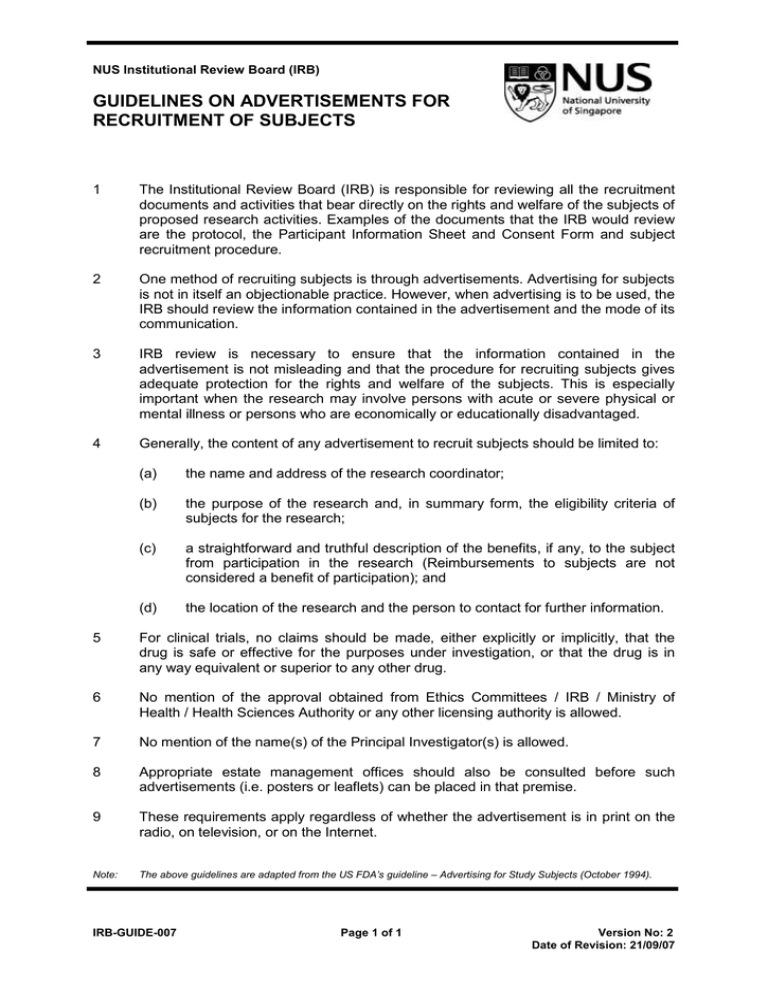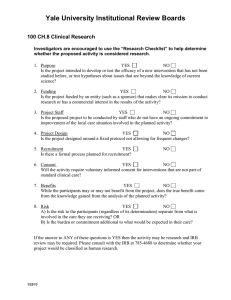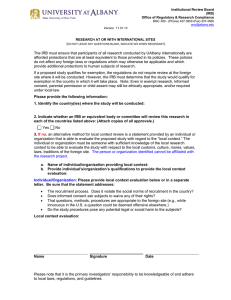GUIDELINES ON ADVERTISEMENTS FOR RECRUITMENT OF SUBJECTS
advertisement

NUS Institutional Review Board (IRB) GUIDELINES ON ADVERTISEMENTS FOR RECRUITMENT OF SUBJECTS 1 The Institutional Review Board (IRB) is responsible for reviewing all the recruitment documents and activities that bear directly on the rights and welfare of the subjects of proposed research activities. Examples of the documents that the IRB would review are the protocol, the Participant Information Sheet and Consent Form and subject recruitment procedure. 2 One method of recruiting subjects is through advertisements. Advertising for subjects is not in itself an objectionable practice. However, when advertising is to be used, the IRB should review the information contained in the advertisement and the mode of its communication. 3 IRB review is necessary to ensure that the information contained in the advertisement is not misleading and that the procedure for recruiting subjects gives adequate protection for the rights and welfare of the subjects. This is especially important when the research may involve persons with acute or severe physical or mental illness or persons who are economically or educationally disadvantaged. 4 Generally, the content of any advertisement to recruit subjects should be limited to: (a) the name and address of the research coordinator; (b) the purpose of the research and, in summary form, the eligibility criteria of subjects for the research; (c) a straightforward and truthful description of the benefits, if any, to the subject from participation in the research (Reimbursements to subjects are not considered a benefit of participation); and (d) the location of the research and the person to contact for further information. 5 For clinical trials, no claims should be made, either explicitly or implicitly, that the drug is safe or effective for the purposes under investigation, or that the drug is in any way equivalent or superior to any other drug. 6 No mention of the approval obtained from Ethics Committees / IRB / Ministry of Health / Health Sciences Authority or any other licensing authority is allowed. 7 No mention of the name(s) of the Principal Investigator(s) is allowed. 8 Appropriate estate management offices should also be consulted before such advertisements (i.e. posters or leaflets) can be placed in that premise. 9 These requirements apply regardless of whether the advertisement is in print on the radio, on television, or on the Internet. Note: The above guidelines are adapted from the US FDA’s guideline – Advertising for Study Subjects (October 1994). IRB-GUIDE-007 Page 1 of 1 Version No: 2 Date of Revision: 21/09/07

